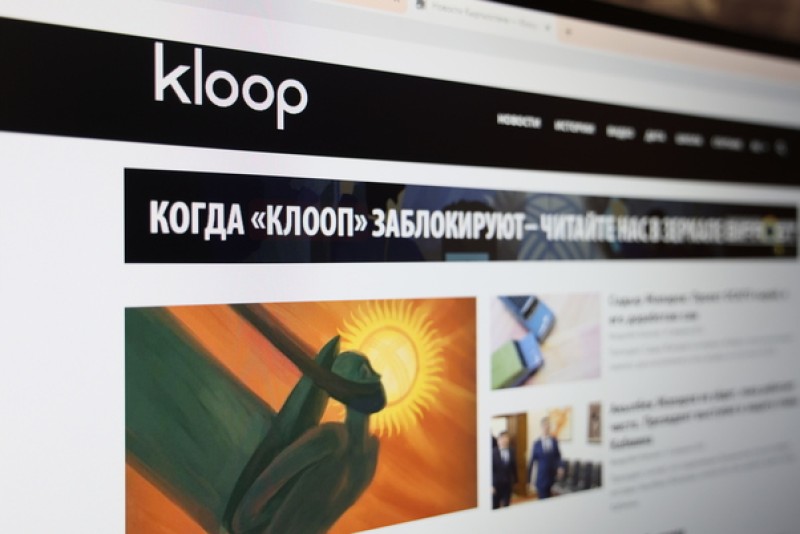On January 25, Kloop published an article detailing a controversy between Kyrgyzstan’s Community Development and Investment Agency (ARIS) and the presidential administration over the cost of reconstructing public facilities destroyed in last year’s border clashes with Tajikistan.
The head of the president’s press service criticized ARIS for overstating the costs of the work, and the agency issued a refutation — but without mentioning the president’s press service explicitly.
When Kloop made the obvious connection between the spokesman’s criticism and ARIS’s response, ARIS lodged an official complaint with the Ministry of Culture, which threatened to block Kloop’s website unless they removed the offending content under a new law against false information that was recently used to shut down RFE/RL’s Kyrgyz service Azattyk.
Kloop has stated that they will not remove the article in question and are prepared to defend themselves in court if their website is taken down.
“We consider illegal and unjust all the laws that Kyrgyzstan’s authorities have passed in recent years which are being used for censorship,” Kloop wrote in a response on their website. “We will not comply with them, because to do so would contradict the standards of free speech and human rights.”
On January 19, the head of the Presidential Press Service Dayirbek Orunbekov criticized the Community Development and Investment Agency (ARIS), claiming it overstated the cost of rebuilding a number of public facilities in the Batken region by almost US$1.5 million. Located on Kyrgyzstan’s border with Tajikistan, dozens of buildings in Batken were destroyed in the armed conflict between the two countries in September 2022.
On January 24, ARIS published a statement refuting the claims about its estimates, calling them “false,” but never naming the president’s press officer as the source of the “disseminated information.” The following day, Kloop published an article making the connection explicit between Orunbekov’s criticism and the agency’s refutation, headlining it: “Orunbekov’s claim that the agency overstated the cost of constructing public facilities in Batken is false.”
Kloop was contacted by ARIS the next day with a request to delete the article or replace it with the agency’s original statement. ARIS claimed that Kloop’s piece was a distortion, noting that in the press release “no official was mentioned, specifically D. T. Orunbekov.”
In response, Kloop changed the headline, which now read: “ARIS denied overstating the costs for public facilities, as Orunbekov previously claimed.” However, when ARIS requested further changes, Kloop refused.
ARIS then submitted a formal complaint to the Ministry of Culture, which became the grounds for the latest demands. Official letters ordering Kloop to delete its article came from both the Ministry of Culture and the Service for Regulation and Supervision of the Communications Sector under the auspices of the Ministry of Digitization. Both bodies warned Kloop that their site may be blocked for up to two months should they fail to comply.
“We do not believe that it is a distortion or misleading to connect two facts,” Kloop’s editor-in-chief Anna Kapushenko told OCCRP. “We’re not willing to delete the article because we believe that we’re right.”
Such complaints against the media became possible in Kyrgyzstan after the adoption in August 2021 of new legislation “On Protection Against False Information.” The law allows Kyrgyz authorities to freely interpret whether statements published by the media are true, and to block news outlets without recourse to the courts if they publish something the government deems false.
Kloop is not the first publication to have been targeted under the new law. Local media outlets Respublica.kg and 24.kg were blocked in July and August last year, respectively. The block on 24.kg was later lifted, but Respublica.kg remains inaccessible in Kyrgyzstan.
In October, RFE/RL’s Kyrgyz branch Azattyk was blocked for two months for its reporting on the border clashes with Tajikistan. In January, however, the Ministry of Culture appealed to a court to make the ban permanent, while Azattyk’s bank accounts have been frozen under money laundering laws, raising concerns that similar actions could be taken against Kloop.
“We have a lot of questions for whoever it is that actually decides if information is false,” said Kapushenko. “That’s what is least transparent, and that’s why we believe that this law is unjust.”
In November, after being stripped of his citizenship, investigative journalist Bolot Temirov was deported to Russia. The case against him was launched after he published an investigation into the business dealings of the family of Kamchybek Tashiev, head of the State Committee for National Security.



